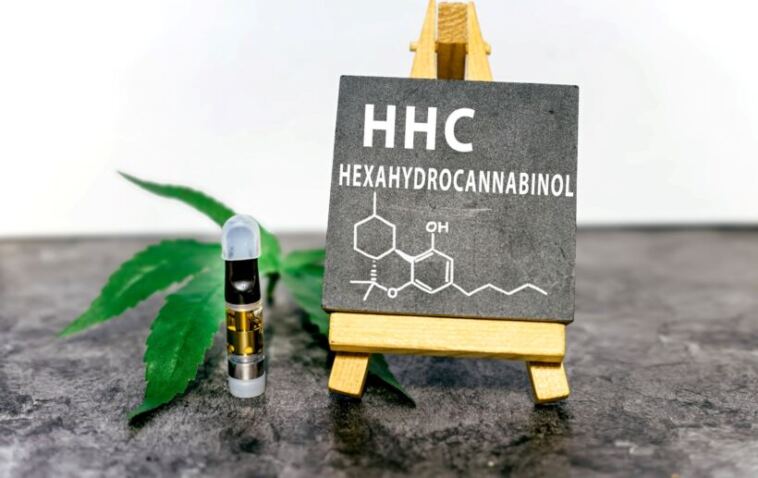- Like
- SHARE
- Digg
- Del
- Tumblr
- VKontakte
- Flattr
- Buffer
- Love This
- Save
- Odnoklassniki
- Meneame
- Blogger
- Amazon
- Yahoo Mail
- Gmail
- AOL
- Newsvine
- HackerNews
- Evernote
- MySpace
- Mail.ru
- Viadeo
- Line
- Comments
- Yummly
- SMS
- Viber
- Telegram
- JOIN
- Skype
- Facebook Messenger
- Kakao
- LiveJournal
- Yammer
- Edgar
- Fintel
- Mix
- Instapaper
- Copy Link
Introduction
In the cannabis industry, there’s a growing interest in hexahydrocannabinol (HHC). Over the years, the availability of new compounds and their possible therapeutic applications have made it crucial to maintain an open mind about what these cannabinoids offer.
Tetrahydrocannabinol (THC) and cannabidiol (CBD) are known for their well-documented effects and therapeutic potential. However, HHC is one of the lesser-known cannabinoids that may be worth checking out.
Continuous research on cannabinoids led to the discovery of other types, including HHC. It may have the potential to manage some chronic conditions. Most studies and trials focus on THC and CBD, so only a few know what HHC is about. Knowing everything about it is crucial to use HHC for pain, anxiety, or other health conditions.
Understanding Hexahydrocannabinol (HHC)
Hexahydrocannabinol (HHC) is a naturally occurring chemical compound present in minute traces in the cannabis plant, mainly in the pollen and seeds. Its molecular structure is strikingly comparable to tetrahydrocannabinol (THC), which is recognized for its psychoactive effects and euphoric high. Generally, it can induce euphoria, confusion, and perception changes. At the same time, it can have several beneficial effects, such as relieving inflammation and pain.
HHC is chemically derived from the psychoactive cannabinoid delta-9 THC, making it psychoactive. It’s capable of causing a high, but it also has calming and relaxing qualities.
Different Ways to Use HHC
When using HHC, you can consume it orally, sublingually, or inhale it. It’s crucial to know that every method has its own specific bioavailability level, the amount the body absorbs, and how long the compound effects take effect.
- Ingestion. HHC is available in dispensaries and authorized cannabis stores in capsules, edibles, and gummies. As a convenient way to consume HHC, you can add it to any dish you love. Once you ingest HHC, it moves into the digestive tract and then to the liver to be metabolized. In most cases, the effects take up to two hours to manifest.
- Sublingual. You can use oils and tinctures to take HHC sublingually. The hydrogenated form is diluted with carrier oils. Place a few drops of the oil under your tongue using a dropper. Hold for up to 60 seconds to allow the compound to diffuse through the bloodstream. In just five minutes, you can feel the effects.
- Inhalation. The inhalation method involves using vape pens and pods. The devices heat the HHC oil to produce vapor, which you inhale via the mouth and move into your lungs. Upon reaching the lungs, the compound is absorbed into the bloodstream. In most cases, the effects only take two minutes to kick in, making inhalation the fastest method.
As you can see, there are different ways to consume HHC, similar to other cannabinoids.
Benefits of HHC
Even today, there’s limited research on how HHC reacts with different bodily systems. Similar to other cannabinoids, HHC interacts with the endocannabinoid system (ECS) in the body. It’s the system with several cannabinoid receptors in the body responsible for maintaining body equilibrium by eliminating inequalities such as inflammation, pain, stress, and anxiety, to name a few.
Unlike CBD, which weakly links with the cannabinoid receptors, HHC can bind and travel as electrical impulses to different body areas to bring purported beneficial effects.
- Promote Calmness And Elevate Mood. Many individuals use cannabis compounds to elevate their mood after a stressful day. The same applies to HHC. Activating the receptors in the central nervous system promotes relaxation and calmness, encouraging better sleep.
- Pain Relief. HHC may have analgesic effects, according to previous animal-based studies. However, preliminary investigations support it as an option for pain relief. Some individuals claim that HHC is more effective than THC in reducing pain.
- Longer Shelf Life. Cannabinoids are known to be highly sensitive to heat and UV light. Due to this, their potency will deteriorate over time from exposure to oxygen. HHC stands out with its longer shelf life than the naturally occurring cannabinoids THC and CBD. The reason for this is the addition of hydrogenated carbon. The molecular changes result in a more stable compound with better heat resistance, which lasts longer.
These are some of the potential benefits HHC has to offer. However, further research is necessary.
Production of HHC
HHC is created by adding hydrogen to THC, a process called hydrogenation. The outcome is a modification to the physical aspect.
The hydrogenation process changes the delta-9 THC structure by switching out a double bond with two hydrogen atoms. The process alters its molecular weight and makes it more stable. Due to this, HHC boasts a longer shelf life and is more resistant to damage caused by heat and UV light.
Potential Side Effects of HHC
Due to the similarities of HHC to THC and its almost intoxicating effect, it’s likely to cause the following side effects:
- Dry mouth
- Dizziness
- Red eyes
- Increased appetite
- Heightened anxiety
- Insomnia
- Elevated heart rate
Although further research is necessary, HHC may cause similar adverse reactions to delta-9 THC.
Final Thoughts
HHC is gaining popularity as a new cannabinoid on the market. It has effects that are strikingly the same as THC, including intoxication. Individuals using HHC claim to feel calm, relaxed, and content. It also has the potential for pain-relieving effects. If you plan on using one soon, familiarity with the basics would ensure a good start and help you decide whether HHC is worth trying.


